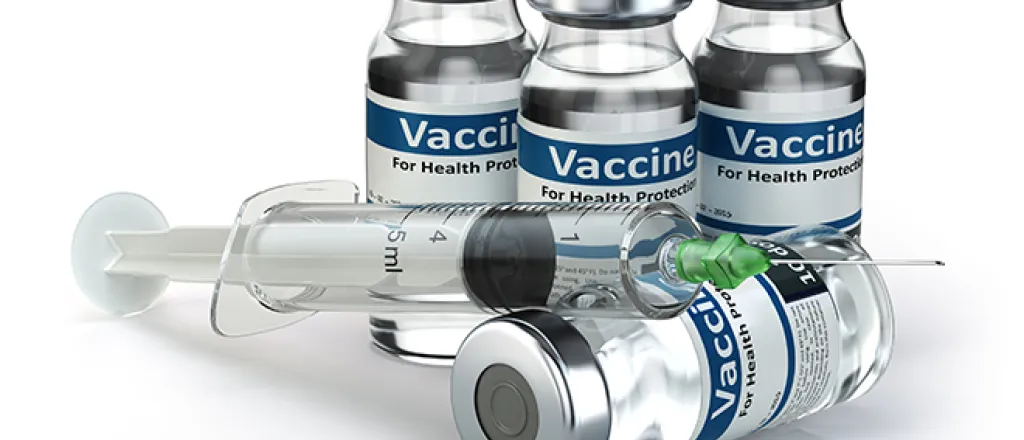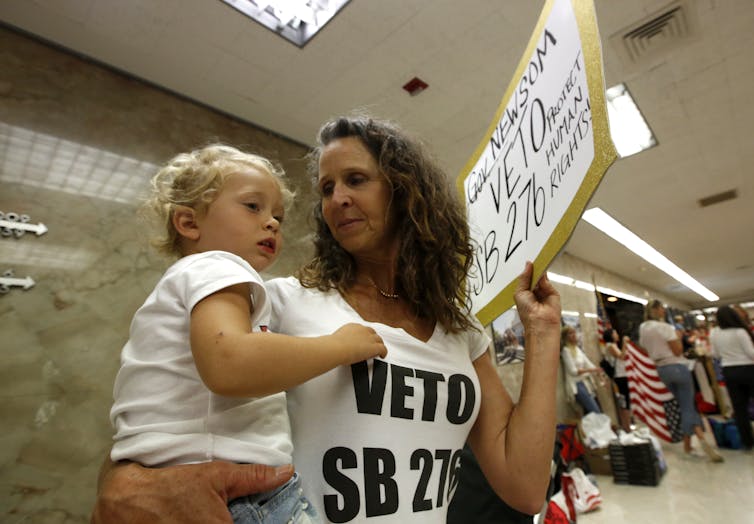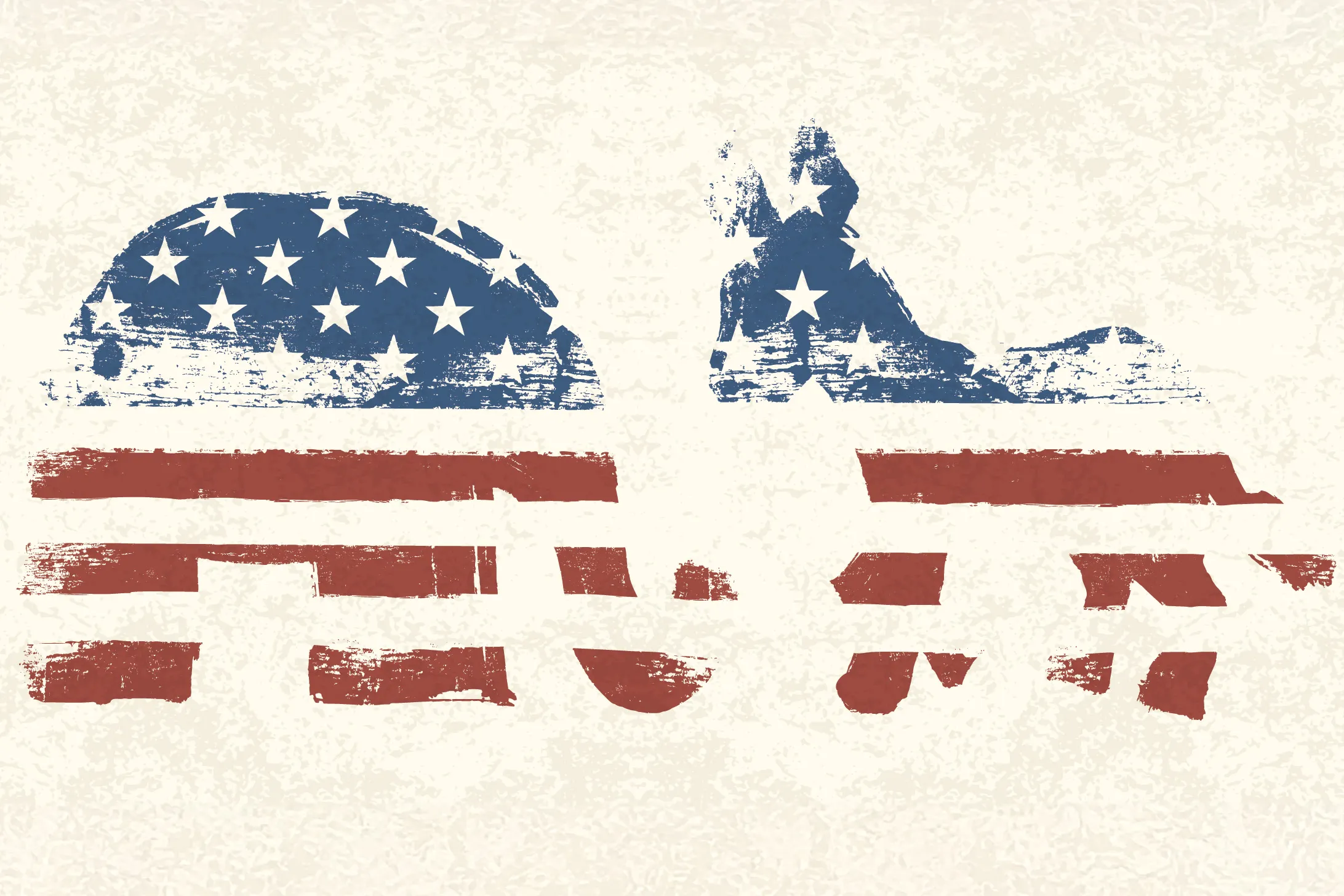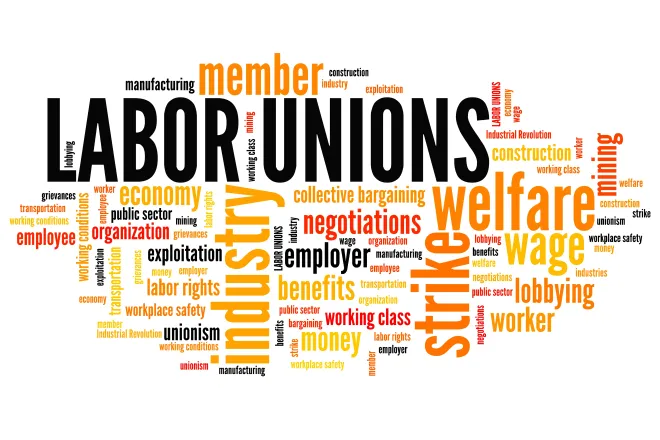
California law to restrict medical vaccine exemptions raises thorny questions over control

California passed a law on Sept. 9, 2019 designed to curb the number of medical exemptions issued for childhood vaccinations. Called SB 276, it restricts these exemptions from mandatory vaccines for children attending school and childcare facilities.
Four years earlier, California passed SB 277 becoming then the third state to remove personal belief exemptions from the state’s mandatory vaccine schedule. In response to measles cases, many states this year have introduced bills to restrict vaccine exemptions.
As a professor who researches and teaches health law, public health law and medical ethics, I believe it’s worth explaining the significance of laws that remove these personal belief exemptions and the implications of SB 276.
Rates of vaccine compliance

In several states, vaccine compliance levels have fallen below target levels, and many people blame exemptions. There are typically two kinds of exemptions. Personal belief exemptions allow parents to decline vaccinations for their child by claiming vaccination is incompatible with their personal beliefs or religion. Medical exemptions are typically for children who have a medical condition that prevents them from receiving a vaccine.
Based on my research, I conclude that medical or personal belief exemptions are only part of the reason for less-than-optimal vaccination rates.
At the time California passed SB 277 for example, 7.2-9.8% of children entering kindergarten in the decade prior to California’s SB 277 law were considered undervaccinated or not up to date on certain vaccines for other reasons – such as schedule, convenience or submitting paperwork. This percentage was significantly higher than parents seeking exemptions.
In all states, parents seeking a medical exemption is quite rare: only 0.2% across states.
In the past few years, however, the number of medical exemptions in California has slightly risen to 0.73%, leading California State Sen. Richard Pan, to warn this increase represents “fake medical exemptions.” Pan, who sponsored the bill and is also a doctor, said SB 276 is necessary to scrutinize the decision-making of “unscrupulous physicians” who provide medical exemptions for “questionable reasons.”
It appeared that the previous law removing personal belief exemptions and addressing undervaccination had an effect. In 2016, the year after California removed its personal belief exemption, kindergarten vaccination rates for MMR increased from 92.9% to 95.6%.
Public health, medicine and parents
Prior to the enactment of SB 276, state law permitted physicians to issue medical exemptions based on their independent medical judgment.
But now, the new law creates a system to monitor and flag medical exemptions overseen by the California Department of Public Health. If the State Public Health Officer judges the exemption is “inappropriate,” the state official can revoke the medical exemption. This is highly unusual if not unique.
Unlike other state public health measures, California’s new law provides the state health department authority to directly intervene in patient care decisions and override physician discretion. It sets a precedent that states can condition important individual rights on whether people follow state mandates for medical care.
Public health agencies provide a crucial and complementary role to medical providers. This new authority expands the state’s role. It does so by allowing the state department of public health to intervene in patient care managed by another physician. This typically is limited to very specific circumstances, which I’ve described here.
When health departments expand into patient care
There are other cases where public health agencies have expanded their scope and blurred the line between public health and patient care in an attempt to control disease epidemics.
These kinds of measures have been contested.
In 2006, New York City’s Department of Health and Mental Hygiene enacted the New York Diabetes Registry, which tracks individual patients and physicians and contacts, both directly with suggestions for disease management. Even though diabetes is not a communicable disease, it exerts substantial impact on society from medical costs and employee productivity. When this program began, it was highly controversial and debated.
Prescription drug monitoring databases are another example. These tools track physician prescribing practices and prevent “doctor shopping” for prescription drugs. This was in response to the opioid epidemic. Opioid abuse undoubtedly directly impacts public welfare and safety, through theft to purchase drugs, impaired driving and child abuse.
Despite significant public impact, the state could not override physician discretion or compel patients to take a particular medication, in either case.
In my opinion, to order a specific treatment oversteps the role of public health authorities and undermines the physician-patient relationship. Moreover, this violates long standing principles of informed consent and patient autonomy.
Why things are different for children

Schools have a duty to enact reasonable policies that protect the health and safety of their students and promote an optimal learning environment.
Schools serve as a nexus for public health issues in addition to communicable disease, such as teenage pregnancy, use of deadly tobacco products like e-cigarettes and drug abuse. Schools may enact disciplinary interventions or provide health information to promote student welfare and safety.
However, the principles behind removing personal belief exemptions go much further. These laws determine that protecting student health and welfare requires students to undergo preventive medical interventions in order to attend school. This reasoning would give states power to decide certain students should take hormonal contraceptives to prevent teenage pregnancy, receive opioid antagonist medications to prevent addiction, or use Ritalin to decrease classroom disruption. Conditioning the right to attend school with whether students comply with a medical intervention does not constitute much of a choice.
Under the law, parents have authority to make medical decisions for their children. The state has only very narrow authority to intrude into the parent-child relationship pertaining to medical care. Courts have held that medical interventions, including vaccines, must be voluntary, based on individual patient need, and require informed consent.
Conferring this power to the state also impacts parents’ fundamental rights to retain custody of their children. In 2019, for example, an Ohio court removed a teenaged child from his parents based on the parents’ disagreement with the physician over how to treat the child’s gender dysphoria.
Questioning conditional rights
No matter how well-intentioned the public health goal, lawmakers and health professionals must assess the threshold question of whether the state’s actions have exceeded legal and ethical limits of power. When we make certain rights conditional based on a notion of public good, this places substantial authority in the state to decide under what circumstances to limit these rights.
We’ve seen cases of mistakes with the eugenics movement, internment camps, Guantanamo Bay torture, and the forcible removal of Native American children from their families all in the name of public necessity. As a society, we have a duty to question this balance of power.
Katherine Drabiak, Assistant Professor, University of South Florida
This article is republished from The Conversation under a Creative Commons license. Read the original article.
















